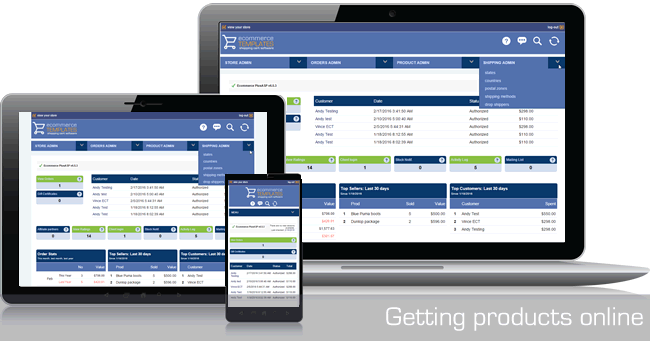Contact sales now: info@ecommercetemplates.com
Ecommerce Templates > Articles > How do I get my products and business online?
If you already have a fair idea of what products or services you want to sell, you'll need to think carefully about how you are going to get those online and which platform / business model / payment set up to employ. We are going to discuss some of the alternatives here, from setting up your own online store to drop shipping and selling on third party platforms.

Shopping cart software is a software package that allows sellers to offer their products online from their own virtual store. Customers can add one or more products to the cart before choosing a payment and shipping method and then checking out. The customer and seller both receive notification via email of the order and that order is processed by the terms set by the store owner.
An online store offers great flexibility as the store owner has control over the shipping costs and methods as well as deciding how payments will be received, whether that be via a third party payment provider, cash on delivery type transaction or a combination of choices. There should also be simplicity in adding and maintaining products as well as product images. This can typically be achieved by basic form filling in the store admin interface with image upload or via a csv file. A csv (comma-separated values) file is a text data file which can be opened and edited in a text editor or spreadsheet application like Excel and is used to populate the product fields required by the store.
Ecommerce platforms can either be licensed or hosted. A licensed store is when you make a one time software purchase to set up a store with the hosting of your choice, with access to all the store files. A hosted platform will incur a recurring fee and access to the store is via an online interface or app. We discuss the differences in our article licensed vs hosted ecommerce platform.
Drop shipping is selling products on your store but shipped directly from the supplier or manufacturer. This means that you don't actually have to hold any stock yourself - when a sale goes through on your store, the supplier is notified of the order and ships accordingly. Let's look at some of the advantages of drop shipping along with the pitfalls to avoid
Most decent shopping cart platforms will have a built-in drop shipping feature but in theory you could also drop ship from third party platforms like ebay or Amazon. To find a supplier yourself there are plenty of drop shipper directory sites you can find with a quick search. Bear in mind that if you find them quickly there is likely to be a lot of ready-made competition so it's also not a bad idea to approach companies directly as well.
If for some reason you prefer not to have your own store it is still possible to sell your products online and do so via a third party ecommerce platform like Amazon, Etsy or ebay. You will need to be wary of the costs involved as there may be a subscription fee on top of the individual sales fee. Also bear in mind that the platform will have complete sales and performance data for your product, something that you may prefer not to share with a potential competitor.
It is of course possible to sell on a third party platform as well as having your own online store. It provides more channels for sales and can be used to move more specialist items or ones that have been hard to sell on your own store. Some platforms can also help target your audience more easily - for example if you are selling handmade items you might want to set up a second store offering your items on Etsy.
Customers are becoming much more security conscious and need to be reassured that their payment details are being handled in a professional manner. There are hundreds, possibly thousands of companies out there offering payment services so the final choice is likely to be a difficult one. Payment processing rates will vary slightly between providers so that is naturally going to be a factor but perhaps not the most important in our view. You need to be able to work with a company that both you and your customers can trust so we advise working with a "known" company.
Customers also like choice, so on checkout give them the option to pay via credit card, via an online service like PayPal and possibly a manual method like cash on delivery.
If you are running your own online store, make sure all your pages are served over a secure https connection - not just the checkout steps. Clearly show what payment methods are available and in your privacy policy make it clear how personal data is respected and handled.
At Ecommerce Templates we offer both a hosted shopping cart and a licensed shopping cart. We also support drop shipping and integrate with the top payment providers. If you require further information or advice please don’t hesitate in contacting us.
